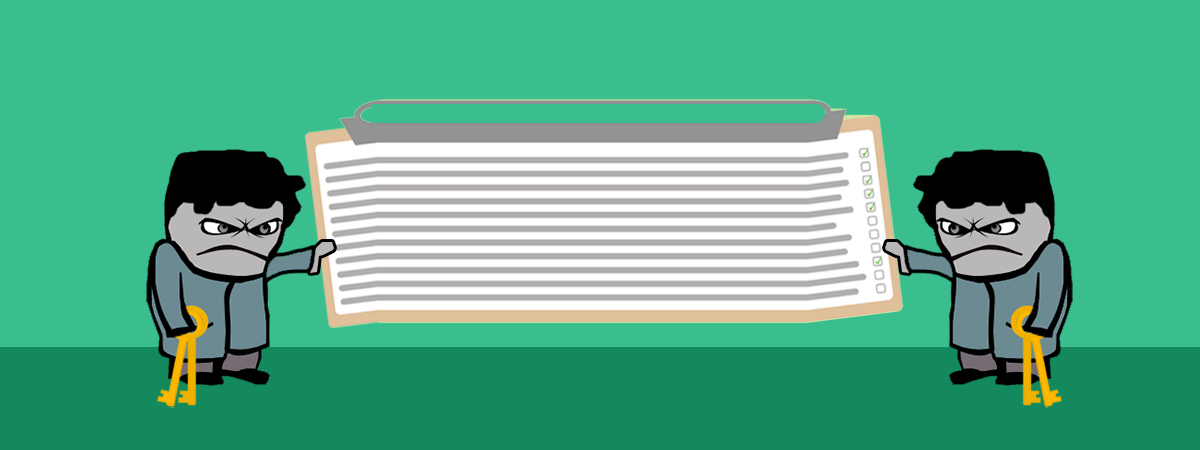
This is up there with one of the most frequently asked questions regarding home ownership- how do I extend a lease on my property? The thing with the duration of a lease is that it can significantly affect the value of a property. Ultimately, the sooner the lease is due to expire, the less the property is worth and the more expensive it can be to extend. Buyers usually look for properties that have a minimum of 95 years; anything below may scare away potential buyers.
Before I continue, I’d just like to apologise for the really horrible “extension” analogy of the ladder imaghen Should I ce. I seriously couldn’t think of anything more suitable :( If anyone has a better suggestion for an image, please let me know. Right, back to business…
A flat with a lease of 100 years is worth roughly the same as a property on a freehold. An apartment on a lease of 60 years, could be valued at approximately 60 percent of the freehold price. Point being, leases are a big deal.
Page contents
- What is a lease?
- Can I extend my property lease?
- When should I consider extending my lease?
- How you can extend your lease
What is a lease?
A lease simply means the right to occupy a property (usually a flat) for a period, which is generally set at 99 or 125 years. At the end of this time, although you can stay on as a tenant, the freeholder will own your property. For information on freehold and leasehold properties, you can go to my Freehold And Leasehold article.
Can I extend my property lease?
Anyone classed as a “qualified leaseholder” can apply for a lease extension. A qualified leaseholder can be defined by the following:
- You’ve owned the property for at least 2 years and;
- The original lease granted was for a term in excess of 21 years
If you meet the above criteria, then you can force the landlord to extend the lease.
When should I consider extending my lease?
The general consensus is that you should consider extending your lease if it’s below 90 years and getting close to 80 years.
There are a couple of reasons for why 80 is the magic number.
Firstly, if a lease has less than 80 years unexpired when you seek to extend it, then you will have to pay what is known as a “marriage value” to the freeholder. Essentially, this is the increase in the value of the property after the lease extension. The Landlord is entitled to 50% of it when a lease with less than 80 years left is extended.
The “marriage value” can be significant, which is why you should consider extending sooner if your lease is below 90 years and getting close to 80 years.
If you want to sell your house, you will need to consider what is regarded as ‘mortgageable’ by most lenders. What I mean by that is, once a lease creeps below 80 years, the number of lenders willing to offer mortgages against the property will decline. It’s near impossible to find a lender that will offer a mortgage if it’s below 60 years. Needless to say, your property will be harder to flog if prospective buyers can’t secure a mortgage against it.
Here’s a quick guide on how you can extend your lease on your leasehold property:
1) Check the details of your lease
The lease runs from the date it was drawn up, not when it was purchased and not the date when the lease was granted. For example, a 99 year lease that was purchased in 2005, 15 years after the lease was actually drawn up (1990), will expire in 2089 – leaving 82 years to run.
2) Check Eligibility
You can only extend a lease for a property that you have owned for at least 2 years; you have a right to extend your lease for an additional 90 years at a peppercorn (zero) ground rent. It doesn’t matter if you haven’t been in occupation. The original lease needs to be long (over 21 years) and it should be residential, as opposed to commercial use.
The law is that you cannot compel a lease extension until you have owned the property for 2 years but that doesn’t stop the freeholder agreeing to give you one in the meantime – but if the landlord is canny (or an ass, depends which way you look at it), he/she will ask a bit more to reflect the fact that you do not have a right to require it!
However, there are exceptions. You can’t force the freeholder to extend a lease if:
- The majority of the leaseholders have applied to obtain the freehold
- Your lease has already ended
- You have sublet your home on a lease of at least 21 years
- The lease was originally granted for less than 21 years
- The freeholder is a charitable housing trust, the National Trust, the Crown (although they may agree), or the property is in a cathedral precinct
- If your freeholder wants to demolish or redevelop the property (in which case you would be entitled to compensation).
3) Contact a Specialist Solicitor
After ensuring that you are eligible for getting an extension, you should contact a solicitor that specialises in property law/leases.
A solicitor will handle all the legal documentations for extending your lease. They will start the process by serving an Initial Notice on the landlord, which will offer a premium for the lease extension. Some of the stages in the process of extending a lease have strict time limits.
I can’t emphasise enough on how important it is to use a solicitor that specialises in property law and leases, and not a general practitioner.
4) Valuation of lease extension
Firstly, a valuer, usually a chartered surveyor, is needed to put a value on the lease extension. I say “needed” because it would be extremely unwise not to have a valuer specialising in this field. He/she will use the valuation formula in the Leasehold Reform Housing and Urban Development Act 1993, as amended. Contact the Royal Institution of Chartered Surveyors for a list of local surveyors who specialise in lease extensions. It’s best to get a quote in writing first.
Most surveyors will charge a fixed fee to prepare the report. This fee should cover the initial inspection of the property, reading the lease and making all the calculations.
There are extra charges if the surveyor is asked to negotiate with the landlord or their agent or for any further work required if the valuation cannot be agreed.
5) Dealing with the freeholder
The owner of the freehold will be given a minimum of two months in which to respond to an offer and if he/she does not, then action can be taken by applying to the County Court for an order that the lease extension be granted on the same terms set out in the initial notice.
Usually the Counter Notice is served in time and a period of negotiation follows between the parties or their respective surveyors.
You should also remember that whilst the law will ultimately be on your side when extending a lease, if a freeholder wants to be difficult he/she can drag the whole process out for ages. The freeholder can still suggest a high figure on the basis that it will take you quite a bit of time and money to challenge it.
6) Valuation Problems
If an agreement is not made on the valuation then the deal could end up in the Leasehold Valuation Tribunal. However, that is quite unusual.
An application to the Leasehold Valuation Tribunal must be made by the flat owner (i.e. the lessee) no later than six months from receipt of a valid counter notice, failing which, if the premium cannot be agreed within the six month window, the initial notice is deemed withdrawn. This means that the lessee will have to pay the landlord’s reasonable legal and surveyor’s fees in addition to his/her own costs and wait for a further 12 months before being able to make a fresh claim under the Act.
This will be costly for the lessee, especially if waiting a year results in the lease term dropping below 80 years! If the applicant meets the criteria by law the freeholder cannot prevent extension of the lease.
Once the Initial Notice is served on the freeholder, then the applicant will be responsible for the reasonable valuation and conveyancing costs. The Notice is also important in setting the valuation date.
7) Further Entitlements
Under the Act the applicant is entitled to a further 90 years on your lease with no ground rent payable on the original term or extension – that is incorporated within the cost of extending. However, there will still be a service charge under the terms of the lease.
8) How much will it cost to extend the lease?
How much the extension is worth and calculating how much you will have to pay is difficult to estimate accurately. The value consists of three main amounts. The first two are to compensate the landlord, for loss of ground rent during the rest of the existing term of the lease, and for not receiving possession of the property at the end of the term.
Thirdly, as already mentioned, where the lease has less than 80 years to go, there is what’s known as a ‘marriage value’, which is arrived at by deducting the value of the property before the extension from the value afterwards, plus the value of the landlord’s interest.
The Leasehold Advisory Service gives an example of a flat with a 68 year unexpired lease, on a ground rent of £50 pa, with a current value of £150k, and an improved value of £165k. An extension of 90 years is likely to cost £8,250. But the same property, on a lease with only 35 years to run, could set you back a whopping £55,368. However, if the current lease is 95 years (and, therefore, attracts no ‘marriage value’) the cost of an extension would be only around £734.
It’s important to note that the leaseholder is liable for both parties’ legal and valuation costs, unless the matter ends up at the Leasehold Advisory Service, who may apportion the costs differently.
Although it may be an expensive business, remember that you are adding value to your property, and, in addition, you will no longer have to pay ground rent.
9) How long does the process take?
Subject to how efficient you are, plus your freeholder, his solicitor, your solicitor and your surveyor, this whole process could take 3-12 months, unless of course it lands up in court because you cannot agree values. However, there are legal timelines in place to prevent the process from dragging on.
Please note
This is just a rough guideline to the process of extending a lease; each case may vary depending on individual circumstances. On that note, Happy lease extending, people…
Disclaimer: I'm just a landlord blogger; I'm 100% not qualified to give legal or financial advice. I'm a doofus. Any information I share is my unqualified opinion, and should never be construed as professional legal or financial advice. You should definitely get advice from a qualified professional for any legal or financial matters. For more information, please read my full disclaimer.


 Landlord Products / Services
Landlord Products / Services




























The above post was for prices in the North of England. I imagine that London prices for solicitors etc may be a lot higher. I was also advised to make sure you get someone who has experience in dealing with lease extensions as it can become quite tricky sometimes.